Welcome New Patients
Dental Emergencies & Second Opinions
Around Burke, VA and Surrounding Areas
Blog
Blog
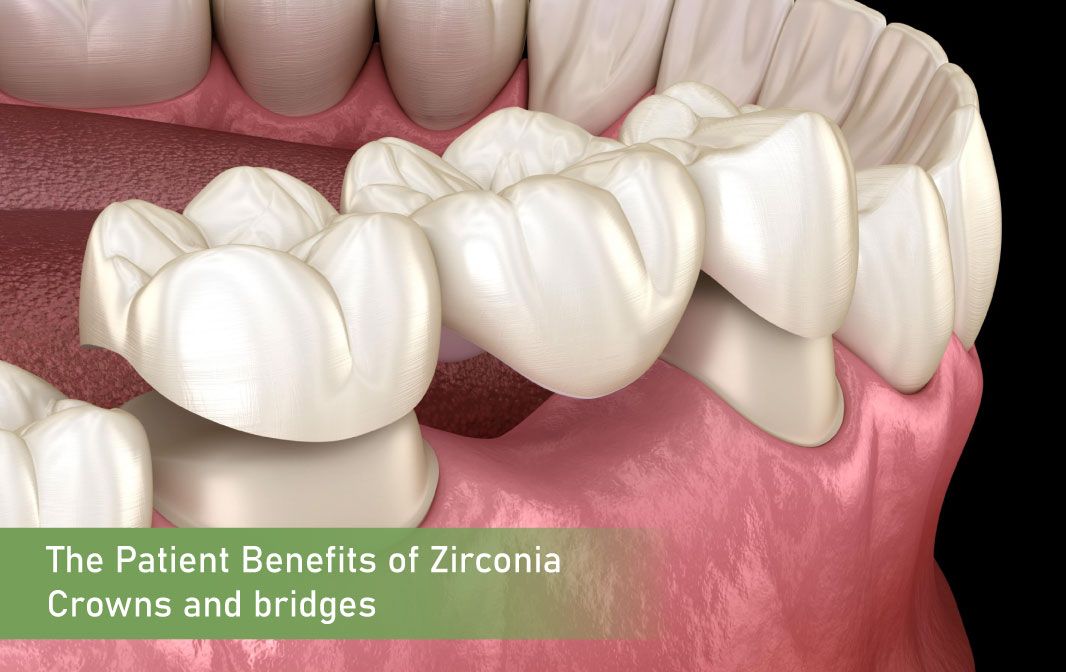
08 Apr, 2024
When it comes to tooth replacement, Zirconia crowns and bridges crafted through Chairside Economical Restoration of Esthetic Ceramics (CEREC) technology have emerged as a superior choice, offering patients a range of benefits over traditional bridge materials. Let's explore why Zirconia crowns and bridges are gaining popularity and the advantages they bring: 1. Customized Fit and Aesthetics: Zirconia crowns and bridges fabricated using CEREC technology offer a customized fit and seamless aesthetics. Digital impressions taken with a state-of-the-art scanner ensure precise measurements and detailed planning, resulting in crowns and bridges that blend seamlessly with the natural teeth, enhancing both appearance and functionality. 2. Durability and Long-lasting Performance: Zirconia crowns and bridges are renowned for their exceptional strength and durability, providing patients with a long-lasting solution for missing teeth. Constructed from high-quality zirconium oxide, these crowns and bridges are highly resistant to wear and fracture, ensuring reliable functionality and aesthetics for many years with proper care. 3. Flexible Treatment Options: While Zirconia crowns and bridges can often be completed in a single visit, some cases may require a two-visit approach with a much shorter turnaround time compared to traditional bridge procedures. This versatility allows patients to receive efficient and expedited treatment without compromising on quality or durability, thanks to the efficiency of CEREC technology. 4. Biocompatible Material: Zirconia is a biocompatible material, meaning it is well-tolerated by the body and reduces the risk of adverse reactions. Patients can enjoy the benefits of a dental restoration that not only enhances their smile but also supports overall oral health and well-being. In summary, Zirconia crowns and bridges crafted through CEREC technology offer numerous advantages for patients seeking to restore missing teeth. From customized fit and durability to flexible treatment options and biocompatibility, Zirconia crowns and bridges deliver exceptional results that elevate both the appearance and functionality of the smile. If you're considering bridge treatment, discuss the benefits of Zirconia crowns and bridges crafted through CEREC technology with your dentist to achieve optimal oral health and confidence.
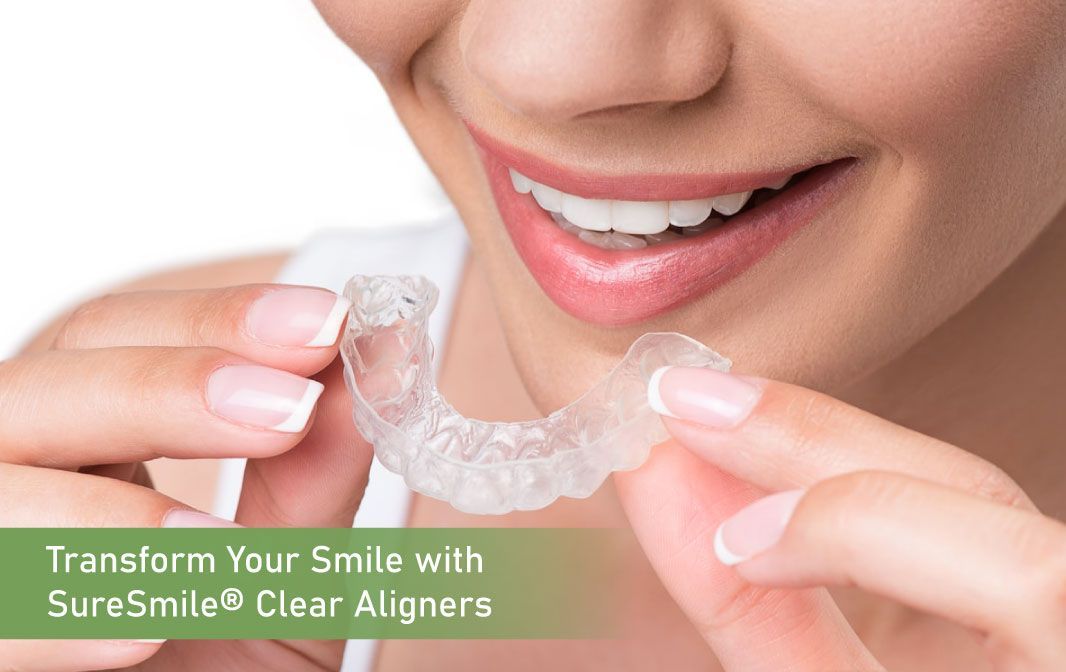
By caseacceptanceacademy
•
01 Mar, 2024
If you want a new smile but are worried about traditional braces, then say goodbye to metal brackets and wires, and hello to SureSmile® Clear Aligners! In the world of orthodontic treatment, SureSmile® stands out as a revolutionary solution for achieving a beautifully aligned smile discreetly and comfortably. SureSmile® Clear Aligners offer a modern approach to orthodontic treatment, providing patients with a virtually invisible way to straighten their teeth. Crafted from smooth, transparent plastic, these aligners are custom-made to fit snugly over your teeth, gently guiding them into the desired position over time. Unlike traditional braces, SureSmile® aligners are removable, allowing for easy maintenance of oral hygiene and the flexibility to enjoy your favorite foods without restrictions. One of the most significant advantages of SureSmile® Clear Aligners is their advanced technology. Each aligner is meticulously designed using state-of-the-art software, ensuring precise movements and optimal results. The treatment process begins with a comprehensive consultation, where your orthodontist will assess your smile and develop a customized treatment plan tailored to your specific needs and goals. Once your treatment plan is established, a series of aligners will be created to gradually shift your teeth into alignment. You will typically wear each set of aligners for about two weeks before progressing to the next set. Throughout the treatment process, you'll visit your orthodontist periodically to monitor your progress and receive new sets of aligners as needed. SureSmile® Clear Aligners offer more than just straight teeth; they provide a comfortable and convenient orthodontic experience. The smooth plastic material ensures a comfortable fit, minimizing irritation to the gums and cheeks commonly associated with traditional braces. Additionally, the ability to remove the aligners makes brushing, flossing, and maintaining good oral hygiene hassle-free. Another significant benefit of SureSmile® Clear Aligners is the companion the SureSmile® VPro™ Device they can come with. When you use the SureSmile® VPro™ Device for just five minutes a day, you can: ● Reduce treatment time ● Speed up tooth movement ● Reduce the number of office visits ● Increase the comfort of your aligners SureSmile® Clear Aligners offer a modern, convenient, and effective solution for achieving the smile of your dreams. With their advanced technology, comfort, and discreet appearance, SureSmile® aligners make orthodontic treatment more accessible and appealing than ever before. So why wait? Take the first step towards a straighter, more confident smile today and join over 500,000 others who have used SureSmile® Clear Aligners!

By caseacceptanceacademy
•
19 Feb, 2024
When it comes to our health, we often focus on the obvious suspects: diet, exercise, and genetics. But what if I told you that the health of your mouth could hold clues about your brain health? Yep, you heard me right – there's a surprising link between oral health and the risk of Alzheimer's disease, and it's time we started paying attention. A recent study conducted by the Alzheimer's Association shed light on this intriguing connection. The analysis, which involved over 8,000 participants, found that older adults with poor dental health were more likely to develop Alzheimer's disease compared to those with healthier mouths. In fact, the study revealed that individuals with tooth loss or gum disease were at a significantly higher risk of developing Alzheimer's, even when other factors like age, sex, education, and genetic predisposition were taken into account. So, what's going on here? Well, it turns out that the bacteria responsible for gum disease might play a role in the development of Alzheimer's. When our gums become inflamed due to poor oral hygiene, these bacteria can enter the bloodstream and travel to the brain, where they may contribute to the formation of plaques and tangles – two hallmarks of Alzheimer's disease. But the connection doesn't end there. Poor oral health can also lead to other health issues, like cardiovascular disease and diabetes, which are known risk factors for Alzheimer's. So, by taking care of our teeth and gums, we might also be protecting our brain health in the long run. Now, I know what you're thinking – what can I do to keep my mouth and my mind in tip-top shape? Well, it all starts with good oral hygiene habits. That means brushing your teeth at least twice a day, flossing regularly, and visiting your dentist for check-ups and cleanings. But it's not just about brushing and flossing – what you eat matters too. A diet high in sugar and processed foods can wreak havoc on your oral health, so try to load up on fruits, veggies, and lean proteins instead. And don't forget to drink plenty of water to help wash away food particles and bacteria that can lead to gum disease. And let's not overlook the importance of kicking bad habits like smoking and excessive alcohol consumption. Not only are these habits harmful to your oral health, but they can also increase your risk of developing Alzheimer's. So, there you have it – the surprising link between oral health and Alzheimer's risk. By taking care of your teeth and gums, you're not just maintaining a killer smile – you're also investing in your brain health for the future. So go ahead, break out that floss, and give your mouth some love – your brain will thank you later.
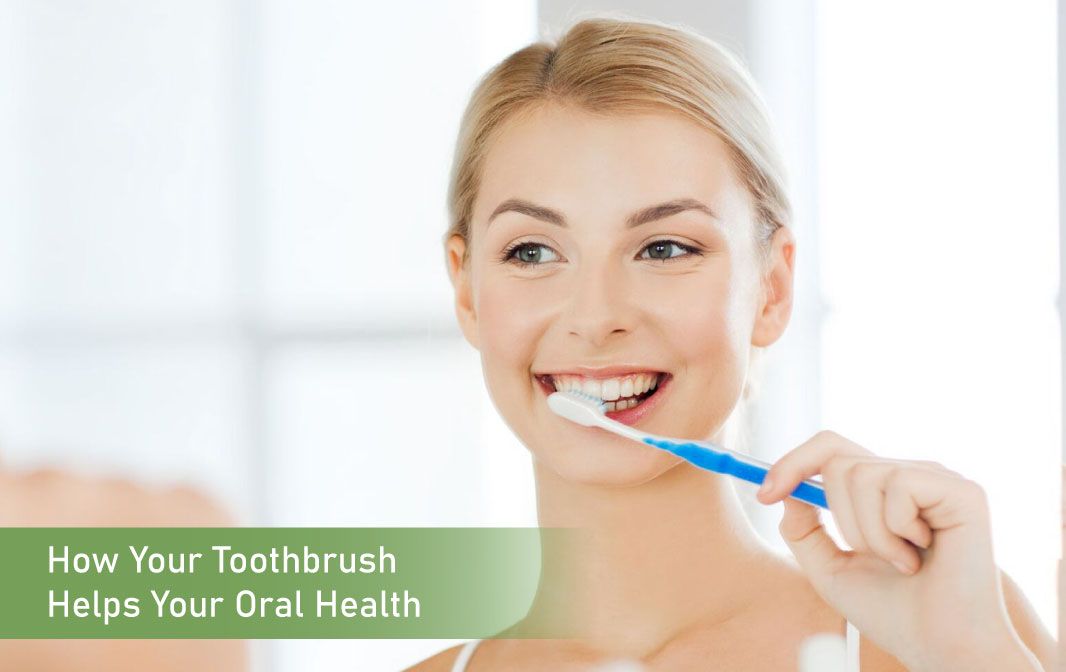
By caseacceptanceacademy
•
11 Jan, 2024
It may be surprising how much impact a toothbrush can actually have on your oral health. It is one of the cheapest and most effective tools we have! You may not think much about your daily toothbrushing routine, but it's a lot more powerful than you might realize. According to a recent article on DentistryIQ, toothbrushing isn't just about maintaining a dazzling smile; it can also save lives. Intrigued? So are we! Your toothbrush is a trusty sidekick in the fight against harmful bacteria in your mouth. These tiny troublemakers can lead to gum disease, tooth decay, and a host of other oral health issues if left unchecked. But that's not all – the repercussions of poor oral hygiene can extend far beyond your mouth. The article highlights the link between instances of hospital-acquired pneumonia (HAP) and brushing a patient’s teeth. According to the article, there seems to be a correlation between a patient brushing their teeth and not getting HAP, likely due to the brushing removing the bad bacteria that otherwise would fester in the mouth. It is amazing that such a cheap, easy solution could prevent deaths. Neglecting your oral health can also impact your respiratory system. Harmful bacteria from your mouth can be inhaled into your lungs, which can worsen conditions like pneumonia and chronic obstructive pulmonary disease (COPD). For everyone by brushing your teeth regularly, you're effectively eliminating those pesky bacteria and preventing gum disease. In essence, you're not just taking care of your teeth; you're also safeguarding your heart and respiratory health. Of course, brushing alone won't do the trick. A well-rounded oral hygiene routine that includes flossing, using mouthwash, and scheduling regular dental check-ups is essential. And remember to replace your toothbrush regularly – a worn-out brush won't clean effectively. Your toothbrush is more than just a tool for a sparkling smile; it's a crucial ally in your quest for overall well-being. So, keep brushing, keep smiling, and remember that every time you pick up your toothbrush, you're taking a small but significant step toward a healthier, happier you. Your toothbrush may not wear a cape, but it's definitely a hero in the world of oral health!
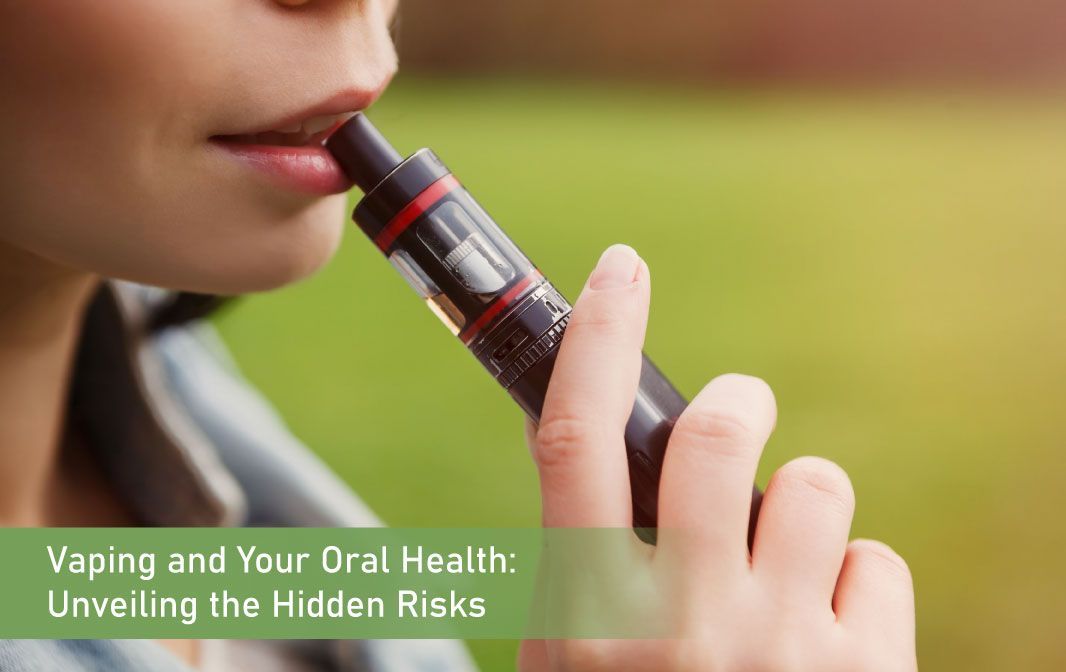
By caseacceptanceacademy
•
12 Dec, 2023
In the modern era, vaping has emerged as a popular alternative to traditional smoking, promising a safer and cleaner option. However, while it may be true that vaping eliminates some of the more harmful aspects of smoking, it's important to understand that it's not without its own set of risks – particularly when it comes to your oral health. 1. Dry Mouth and Reduced Saliva Production One of the primary concerns associated with vaping is its tendency to cause dry mouth or xerostomia. The act of inhaling vapor can lead to a reduction in saliva production, which is crucial for maintaining oral health. Saliva helps wash away food particles, neutralize acids, and fight off harmful bacteria that can lead to tooth decay and gum disease. When your mouth lacks an adequate supply of saliva, these protective mechanisms are compromised. 2. Increased Risk of Gum Problems Healthy gums are the foundation of a healthy smile, and vaping can pose a significant risk to gum health. The chemicals in e-cigarettes can irritate gum tissue, leading to inflammation and bleeding. Furthermore, nicotine, a common component in e-liquids, restricts blood flow, making it more difficult for gums to heal properly. Over time, these factors can contribute to the development of gum disease, a condition that can result in tooth loss if left untreated. 3. Tooth Sensitivity Many vapers experience increased tooth sensitivity, which can be attributed to the weakening of tooth enamel. E-liquids contain acidic components that can erode the enamel, leaving teeth vulnerable to temperature changes and acidic attacks from other sources in your diet. 4. Bad Breath Persistent bad breath is another potential consequence of vaping. The combination of dry mouth and the presence of bacteria in the mouth can lead to unpleasant odors. This not only affects your social interactions but may also be indicative of underlying oral health issues. 5. Increased Risk of Tooth Decay The allure of sweet-flavored e-liquids can be enticing, but it's important to remember that many of them contain sugars that promote bacterial growth. These sugars can lead to the formation of cavities if proper oral hygiene isn't maintained. Additionally, the acidic nature of vaping can further contribute to enamel erosion, exacerbating the risk of tooth decay. Vaping increases your risk of health issues (including oral cancer in some cases), especially oral health issues. In addition to everything we’ve mentioned above, vaping also increases the risk of periodontal disease. While vaping is a safer alternative to cigarette smoking, it is not “safe.” If you vape or use tobacco products, make sure that you are staying on top of your oral health by brushing regularly, flossing, and visiting the dentist. Be honest with your dentist about your tobacco use so that we can come up with the best dental hygiene routine for you. Call us today to set up your next cleaning!

21 Nov, 2023
We all know that maintaining good oral health is essential for our overall well-being, but the costs associated with dental care can sometimes leave us with frowns. That's where dental insurance comes to the rescue! In this blog post, we'll take a closer look at four important steps to help you choose the right dental insurance plan and keep your smile shining bright. Understand Your Needs Before diving into the world of dental insurance, it's crucial to understand your specific needs. Take a moment to assess your oral health and potential future needs. Do you have any ongoing dental issues, or are you simply looking for preventive care? Knowing your needs will help you determine the level of coverage you require. Evaluate In-Network Dentists Most dental insurance plans have a network of preferred providers, also known as in-network dentists. These dentists have agreements with the insurance company to provide services at a discounted rate. It's a good idea to check if your current dentist is in-network, as this can lead to significant cost savings. If you don't have a dentist, consider researching in-network options in your area. Compare Plan Options Dental insurance plans come in various shapes and sizes, so it's important to compare them carefully. Look at factors such as monthly premiums, annual deductibles, and coverage limits. For instance, some plans may cover preventive care like cleanings and X-rays entirely, while others may require you to pay a percentage of the cost. Additionally, consider waiting periods, exclusions, and whether orthodontic coverage is included if you or a family member might need braces. Review Annual Maximums One key aspect to consider is the annual maximum benefit provided by the dental insurance plan. This is the maximum amount the insurance company will pay for your dental care within a year. Be mindful of this limit, as it can vary from plan to plan. If you anticipate needing extensive dental work in the future, you may want to choose a plan with a higher annual maximum to ensure you have adequate coverage. Choosing the right dental insurance plan involves careful consideration of your individual needs, in-network providers, plan options, and annual maximums. It's important to do your research and weigh the pros and cons of each plan to find the one that fits your budget and requirements. Remember, dental insurance isn't just about saving money; it's about investing in your oral health and maintaining that radiant smile. So, take the time to choose a plan that ensures your teeth stay in tip-top shape without breaking the bank. With these four steps in mind, you'll be well on your way to selecting the perfect dental insurance plan that keeps your smile healthy and bright for years to come. Cheers to a future filled with confident grins!
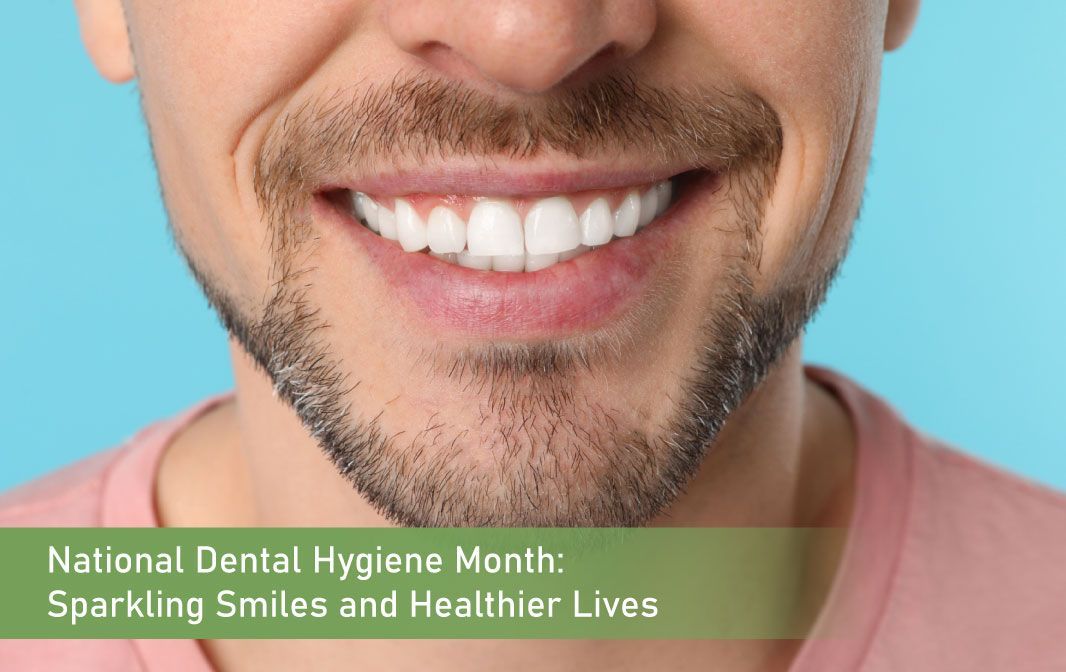
By caseacceptanceacademy
•
17 Oct, 2023
It’s October, which means that Halloween is quickly approaching (and the start of the Holiday season), but it also means that it’s National Dental Hygiene Month! Yep, it's that time of year when we celebrate the importance of good oral health. So, let's dive into some interesting dental facts and friendly reminders to keep those smiles shining. Why National Dental Hygiene Month? You might be wondering, "Why do we even have a month for dental hygiene?" Well, it's not just about aesthetics; it's about overall health. Neglecting our dental health can lead to some serious issues, from cavities to gum disease, and even systemic health problems. National Dental Hygiene Month serves as a reminder to prioritize our oral well-being. The Daily Drill: Brush and Floss First things first, let's talk about the daily dental drill – brushing and flossing. Brush your teeth at least twice a day for two minutes each time. It's a small investment for a big payoff – a healthy, happy smile. And don't forget to use fluoride toothpaste and a soft-bristle toothbrush for the best results. Flossing might seem like a chore, but it's a game-changer. It removes food particles and plaque from between your teeth, where your toothbrush can't reach. Plus, it helps prevent gum disease and keeps your breath fresh. If you struggle with traditional floss, try floss picks or a water flosser – they make the process much easier. Watch Your Diet What you eat plays a massive role in your dental health. Sugary snacks and drinks are like an all-you-can- eat buffet for harmful bacteria in your mouth. They feast on sugar and produce acids that attack your enamel. Try to limit your sugary snacks and instead opt for healthier snacks like crunchy fruits and veggies and stay hydrated with water. Your teeth will thank you! Regular Checkups Even if you're diligent about your oral hygiene routine, you still need regular dental checkups. Dentists can spot issues you might not even be aware of and provide preventative care. So, don't skip those appointments! They're your smile's best friend. Spread the Word National Dental Hygiene Month isn't just for you – it's for everyone. Share your knowledge with family and friends. Encourage them to schedule dental appointments and take care of their smiles, too. We're all in this together! And now, to sweeten the deal, here are some fun dental facts to chew on: Tooth enamel is the hardest substance in your body – it's even tougher than bone! On average, we spend around 38.5 days of our lives brushing our teeth. That's dedication! In ancient times (and on the show Survivor), some folks used chew sticks as toothbrushes. National Dental Hygiene Month is a reminder to prioritize your oral health and share the importance of dental hygiene with those around you. For more information and resources, check out the ADHA's National Dental Hygiene Month page.
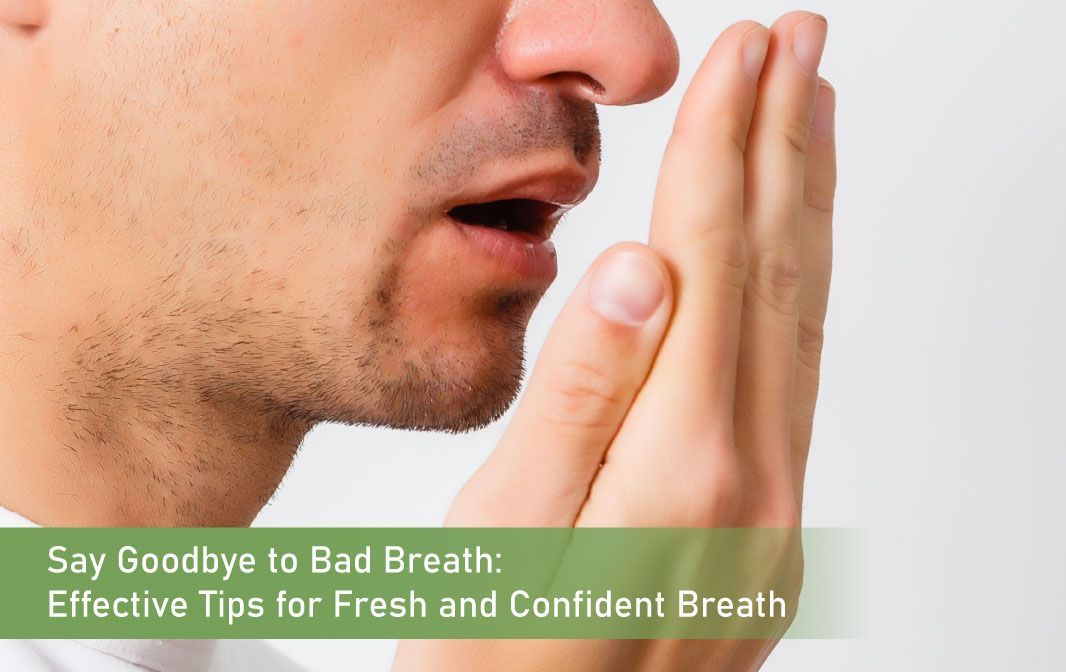
By caseacceptanceacademy
•
20 Sep, 2023
Bad breath, also known as halitosis, can be an embarrassing and socially uncomfortable problem. Whether it's a one-time occurrence or a persistent issue, nobody wants to be the person with foul-smelling breath. The good news is that getting rid of bad breath is often a matter of making a few simple changes to your daily routine. In this blog post, we will explore some easy and effective ways to banish bad breath and enjoy fresh and confident breath. 1- Maintain Good Oral Hygiene The foundation of fresh breath starts with good oral hygiene. Brush your teeth at least twice a day and don't forget to clean your tongue and gums. Use fluoride toothpaste and replace your toothbrush regularly, about every 3-4 months. Flossing is equally important to remove food particles and plaque between your teeth that your toothbrush can't reach. 2- Stay Hydrated Dry mouth is a common cause of bad breath. Drinking plenty of water helps to keep your mouth moist, preventing bacteria from multiplying. Aim for at least eight glasses of water a day and consider sugar-free gum or lozenges to stimulate saliva production. 3- Avoid Strong-Smelling Foods Certain foods like garlic, onions, and spicy dishes can leave a lasting odor in your mouth. Try to avoid these foods before social events or important meetings. If you do indulge, be sure to brush and floss afterward. 4- Sugar-Free Gum and Mints Sugar-free gum or mints can help mask bad breath temporarily. Chewing gum stimulates saliva production, which naturally cleanses your mouth. Look for products that contain xylitol, a natural sugar substitute that can also reduce bacteria. 5- Mouthwash with Alcohol-Free Options Mouthwash can provide a quick breath freshener, but avoid those with alcohol, as they can contribute to dry mouth. Choose an alcohol-free mouthwash that targets bad breath and kills bacteria. 6- Maintain a Healthy Diet Eating a balanced diet rich in fruits and vegetables can help prevent bad breath. These foods increase saliva production and provide essential nutrients that promote oral health. Additionally, consider adding probiotic-rich foods like yogurt to your diet to maintain a healthy balance of oral bacteria. 7- Regular Dental Check-ups Schedule regular dental check-ups and cleanings every six months. Your dentist can identify and address any underlying dental issues that may be contributing to your bad breath. Banishing bad breath is achievable with a few simple lifestyle changes. By maintaining good oral hygiene, staying hydrated, and making smart dietary choices, you can enjoy fresh and confident breath that will leave a positive impression on those around you. Don't let bad breath hold you back – follow these tips and say goodbye to halitosis for good.
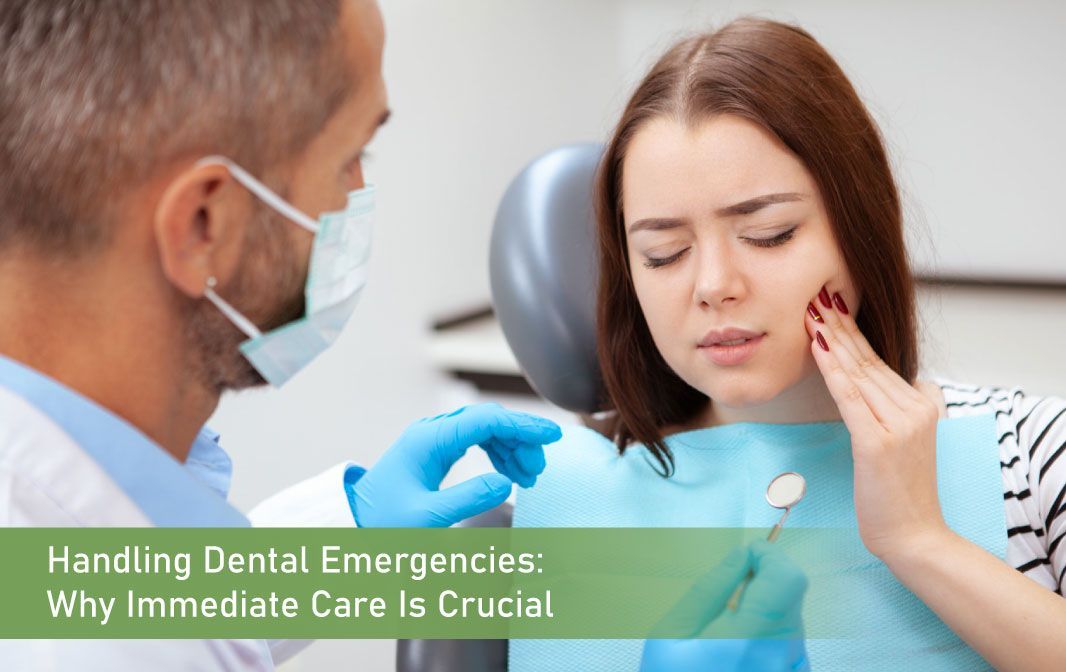
By caseacceptanceacademy
•
17 Jul, 2023
Nobody likes to experience dental emergencies, but they can happen unexpectedly. Whether it's a sudden toothache, a broken tooth, or a knocked-out tooth, knowing how to handle such situations can make a significant difference in preserving your oral health. In this blog post, we'll explore the importance of getting immediate care for dental emergencies and provide you with some valuable tips on how to handle them effectively. Get Immediate Care When it comes to dental emergencies, time is of the essence. Seeking prompt dental care can prevent further damage, alleviate pain, and improve the chances of successful treatment. Ignoring or delaying treatment for dental emergencies can lead to complications, increased pain, and even permanent tooth loss. Remember, your oral health plays a vital role in your overall well-being, so it's crucial to prioritize it. Common Dental Emergencies Toothache: Rinse your mouth with warm saltwater and gently floss around the affected tooth to dislodge any trapped debris. Avoid placing aspirin directly on the tooth or gums, as it can cause burns. Contact your dentist for an appointment as soon as possible. Chipped or Broken Tooth: Rinse your mouth with warm saltwater to clean the area. If there's bleeding, apply a piece of gauze to control it. Save any broken tooth fragments if possible. Contact your dentist immediately to schedule an emergency visit. Knocked-Out Tooth: Handle the tooth carefully by the crown (top part) and rinse it gently with water, avoiding scrubbing or removing any attached tissue. Try to reinsert the tooth back into the socket if you can, or keep it moist by placing it in milk or saliva. Time is crucial in this situation, so contact your dentist or visit an emergency dental clinic right away. Lost Filling or Crown: If a filling or crown falls out, try to keep the affected tooth clean and protected. You can apply dental cement or temporary dental adhesive available at most pharmacies to cover the exposed area temporarily. Contact your dentist to arrange an appointment for repair. Dental emergencies can be distressing, but being prepared and knowing how to handle them can make a significant difference in the outcome. Remember, seeking immediate care is essential to prevent further damage, relieve pain, and preserve your oral health. If you or a loved one experience a dental emergency, don't hesitate to contact your dentist or visit an emergency dental clinic. They have the expertise and resources to provide the necessary care and guide you through the recovery process. Take care of your teeth, practice good oral hygiene, and schedule regular dental check-ups to minimize the risk of dental emergencies. However, if one does occur, stay calm, follow the tips mentioned above, and reach out for professional help promptly. Your smile is worth it! Disclaimer: This blog post is for informational purposes only and does not replace professional dental advice. Always consult your dentist or healthcare provider for personalized guidance regarding your dental health.

By Jeff Palmer
•
16 Jun, 2023
A beautiful smile not only boosts your confidence but also reflects your overall health. That's why dental care is an essential aspect of our well-being. While dental insurance can provide peace of mind and financial support, it's crucial to be aware of potential scams that may leave you with more gaps in your wallet than in your teeth. In this blog post, we'll explore how to avoid dental insurance scams, and we'll provide you with some eye-opening examples to keep you well-informed. Research, Research, Research When it comes to choosing dental insurance, research is your best friend. Take the time to compare different insurance providers, their policies, and customer reviews. Be cautious of attractive deals that seem too good to be true. A reputable insurer will have a solid online presence, clear policies, and positive feedback from customers. Example: Imagine stumbling upon an online ad promising an unbelievable dental insurance plan at an incredibly low cost. Upon further investigation, you discover that the company's website lacks essential information, contact details, and customer testimonials. Trust your instincts and steer clear of such dubious offerings. Verify the Legitimacy Before finalizing any insurance plan, ensure that the provider is legitimate. Check if they are registered and licensed with the appropriate regulatory authorities. Be wary of individuals or companies that pressure you into making immediate decisions or ask for personal information up front. Example: You receive an unsolicited phone call offering dental insurance at an unbeatable rate. The caller insists on obtaining your credit card details right away, claiming it's a limited-time offer. Remember, reputable insurance companies won't use such aggressive tactics or rush you into making impulsive choices. Understand the Coverage Thoroughly review the coverage details of any dental insurance plan you consider. Pay close attention to the limitations, deductibles, waiting periods, and exclusions. If something seems unclear, don't hesitate to reach out to the insurance provider for clarification. Example: You sign up for dental insurance, assuming that all services, including cosmetic dentistry, will be covered. However, upon needing a cosmetic procedure, you realize that your policy specifically has waiting periods and a missing tooth clause. Avoid this disappointment by being diligent and ensuring that the coverage matches your needs. Seek Recommendations Consult your trusted dentist or friends and family who have experience with dental insurance. They can offer valuable insights and recommend reputable insurance providers they have worked with in the past. Personal recommendations can provide peace of mind and help you make an informed decision. Example: Your dentist recommends a dental insurance provider known for their exceptional customer service and comprehensive coverage. By following their advice, you can feel confident that you're making a wise choice based on reliable information. At Sterling Dental Center, we offer an in-house discount plan that can beat the value of most individual dental plans. This depends on your dental need so do not hesitate to ask. Taking care of your dental health is essential, and dental insurance can be a valuable tool in ensuring affordability and accessibility. By staying vigilant, researching thoroughly, and seeking trustworthy recommendations, you can avoid falling victim to dental insurance scams. Remember, your smile deserves the best protection, so don't hesitate to take the necessary steps to safeguard your oral and financial well-being. With these tips in mind, you can confidently navigate the world of dental insurance and keep your smile shining brightly for years to come. Stay informed, stay protected, and keep on smiling!
Office Hours
Mon - Thu: 7:00am-4:00pm
Friday: 7:00am-1:00pm
Saturday: Appointment Only
Sunday: Closed
© 2024
All Rights Reserved | Kings Park Dental Center